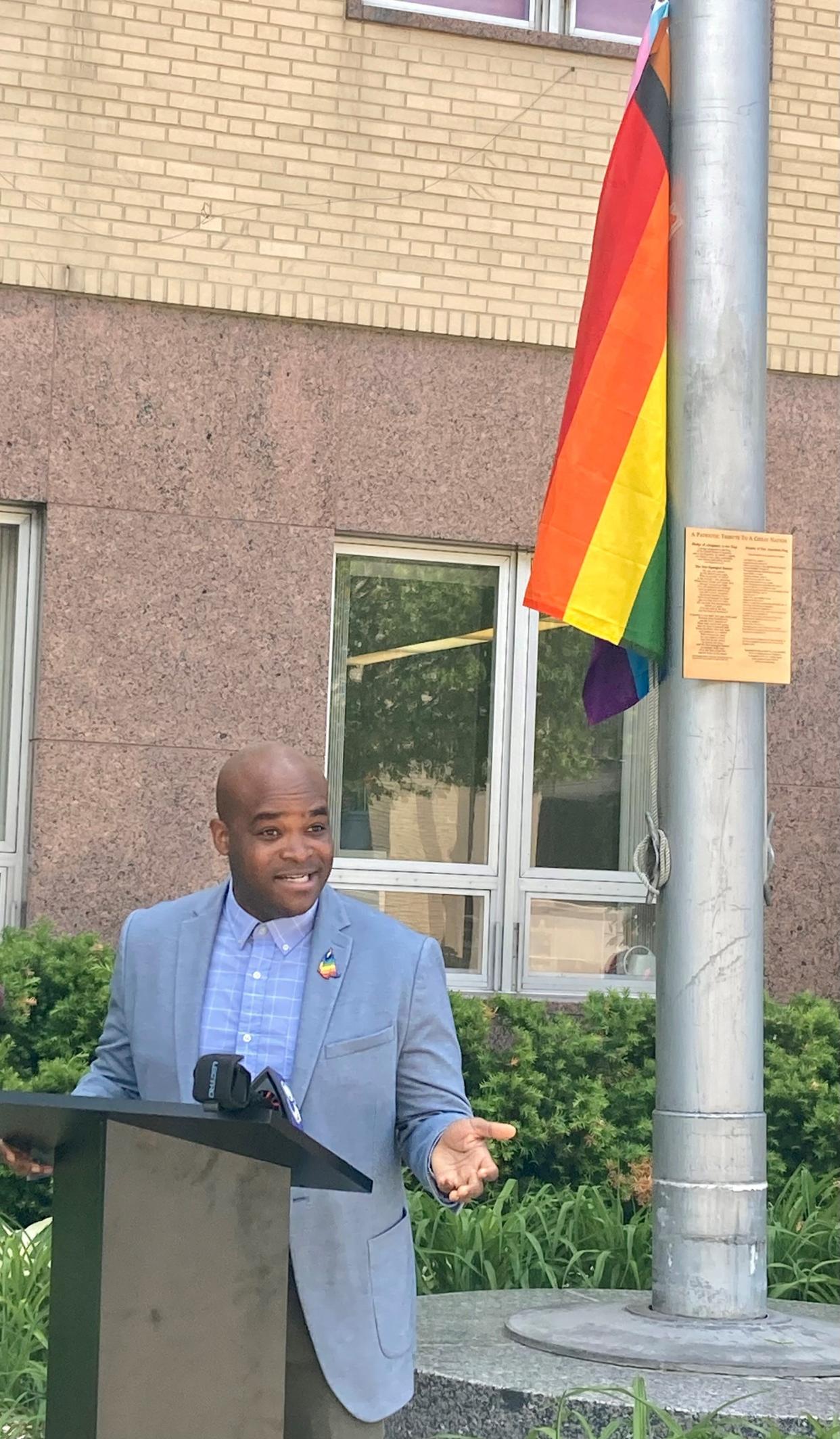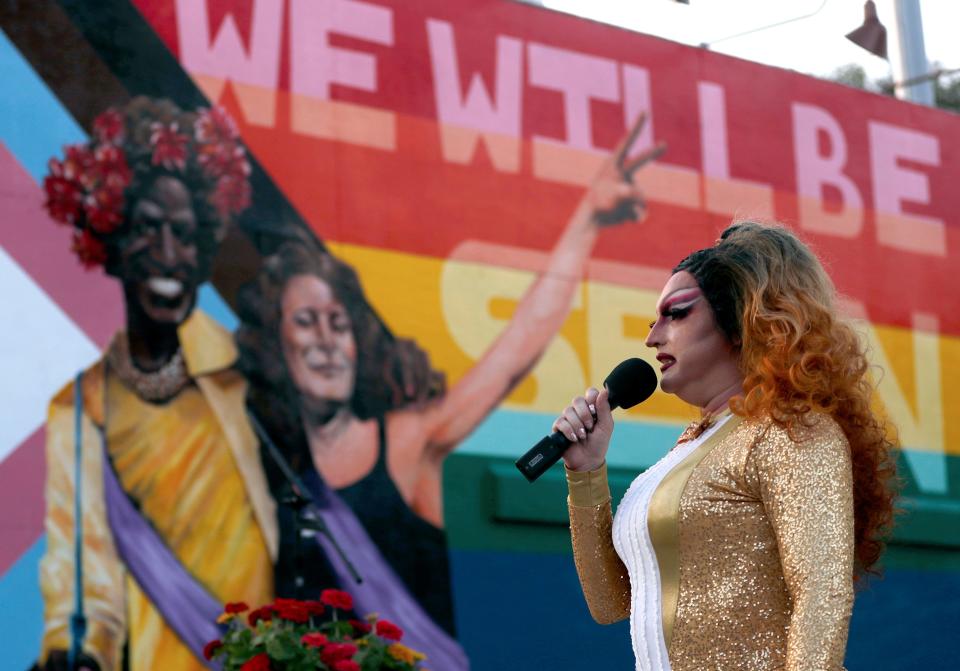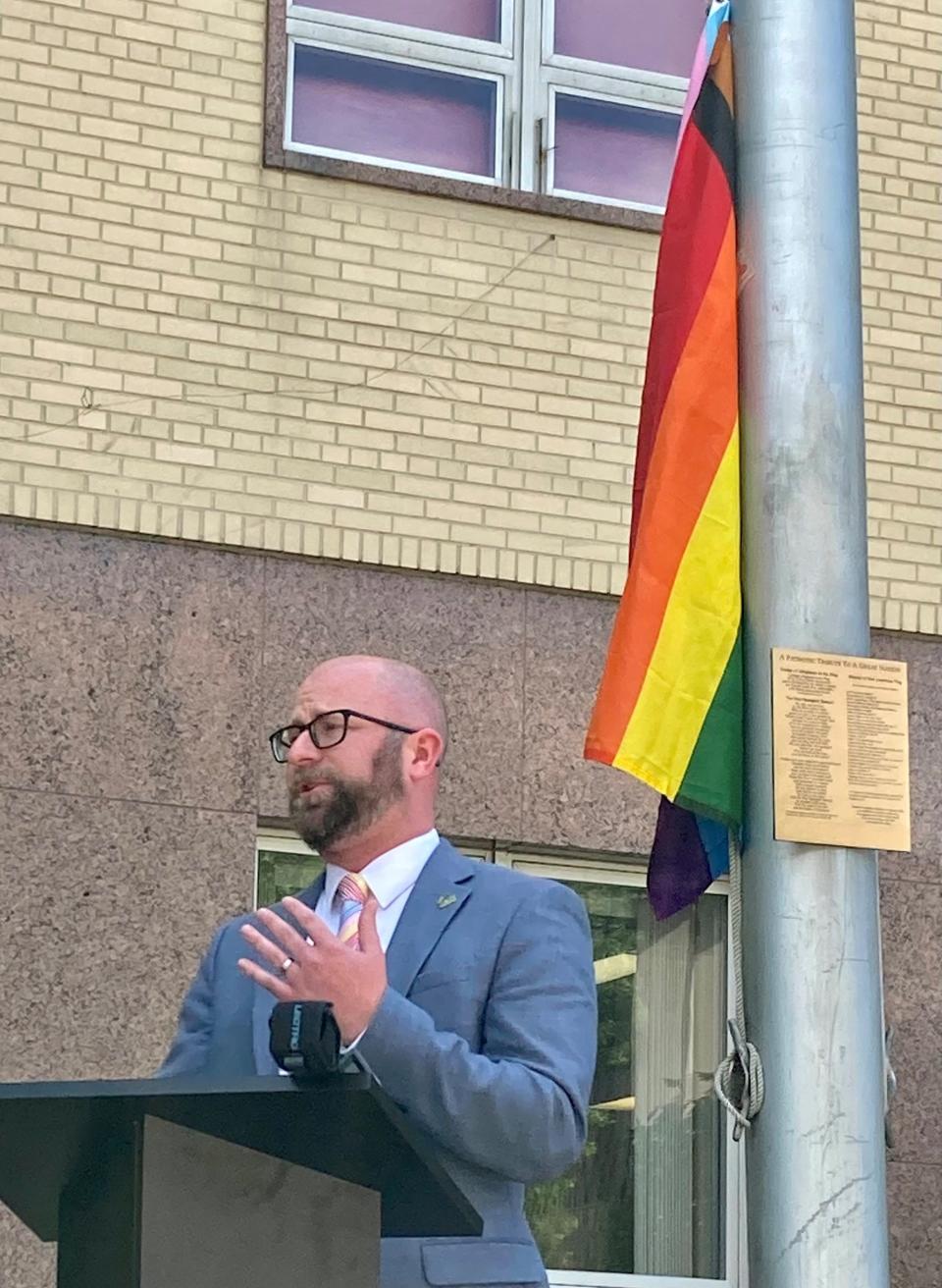Green Bay inches closer to perfect score in LGBTQ rights, though not every space in city is welcoming

When Michael Vinson and his husband married in Green Bay in 2012, they couldn't guess that their children would each play baby Jesus in the Christmas Pageant at their church years later.
It's been a tradition at Union Congregational to select the newest baby in the church community to play the role of Jesus, and the parents to represent the holy family. In 2014, Vinson and his husband stood before their pleasantly surprised congregation in their Sunday best, their baby swaddled in the manger.
Vinson can still remember the way they were supported then, the smiles, encouragement and sense of love.
"We weren't excluded from that incredible tradition. They still had me and my husband stand next to our son Elijah as baby Jesus and stand in as the Holy Family, which was incredibly special and poignant and memorable," Vinson said. "Years later, other congregants still talk about how much it meant to them, to see our family in that moment."
Vinson has been dedicated to ensuring that the LGBTQ community experiences that level of support and acceptance wherever they go in the wider Green Bay area. With the city's Equal Rights Commission, he's worked with Mayor Eric Genrich and his office for years to influence laws and policies to protect and empower the LGBTQ community. That commitment to change is paying off, based on a national advocacy group's rating for inclusive cities.
RELATED:Meet the UWGB professor behind decades of work advancing LGBTQ+ rights on campus
Green Bay scored a 90 out of 100 on the Human Rights Campaign's Municipal Equality Index, a rubric that examines and evaluates LGBTQ civic laws and liberties of select cities across the United States. Four years ago, the city ostensibly failed in the eyes of the campaign, scoring the lowest of all seven rated Wisconsin cities at 28. By 2021, Green Bay tripled its score to 84 and, this past month, it elevated the number again by six points.
The six-point boost is a testament to the city's ongoing efforts to support the LGBTQ community, advocates say. One component recognized this year for the first time is Green Bay's non-discrimination health benefits, which gives city employees the option of receiving gender-affirming health care.
Human Rights Campaign ranked Madison, Milwaukee and Racine with top scores of 100, Appleton 93, Oshkosh 78 and Kenosha 51. Appleton was the only city whose score went down, by one point from last year. Racine soared from 86 last year to a perfect score this year.
"To be at 90, at this point, is a good feeling. And I think it reflects the fact that we've been pretty intentional about making this progress from my office to our Common Council, to our police department, and definitely our Equal Rights Commission and other community members," Genrich said. "It's nice to see that work recognized by the Human Rights Campaign."
A timely win for Green Bay's LGBTQ community

Justis Tennpenny, a Green Bay-based LGBTQ advocate, said people "hold on to" such indicators as positive signs amid tragedies like the Club Q shooting in Colorado Springs that left five people dead and Pulse Nightclub shooting in Orlando that left 49 dead. Both were considered safe spaces for LGBTQ people prior to their attacks.
The city's highest-ever score, he said, "shows the majority of our population supports our community. We can't be afraid of the minority."
Green Bay received perfect scores across a few categories, including non-discrimination laws surrounding housing, employment and public accommodations. Additionally, Green Bay's law enforcement fairly reports hate crimes and engages with the LGBTQ community in a thoughtful, constructive way, according to the scorecard. The city also scored big on equality measures, both in terms of leadership positions and legislative efforts.
Vinson said that the city's success depends on its ability to mirror Wisconsin's most exemplary cities for pro-LGBTQ policies and laws, like Madison and Milwaukee.
The Rev. Bridget Flad Daniels, the senior minister at the LGBTQ-friendly Union Congregational, has prioritized inclusion efforts at her church and knows the power it can have on her congregants, whether they identify as LGBTQ or an ally. Flad Daniels celebrates the positive score in the community, holding the conviction that "God doesn't care who you love; God cares that you love."
Flad Daniels held a prayer service on the steps of the church following the tragic news of Pulse Nightclub. Like Tennpenny, she believes that people need to focus on celebrating love and "not let people who hate us rule the day."
"We have a very firm understanding that someone's sexuality, sexual identity, gender expression, in no way determines whether God loves them, and therefore how it is that they can be a part of our church community," Flad Daniels said. "I can't tell you how often we have straight people say that they are joining the church because the church is open and affirming."
Room for improvement
Genrich has a few ideas of how Green Bay can notch up its rating. He hopes to extend non-discrimination language in ordinances to businesses that contract with the city of Green Bay.

Genrich said he'd also like to see the city follow Appleton's lead of adopting a ban on conversion therapy, the controversial practice of attempting to alter someone's same-sex attractions or gender expression by promoting cis-gendered heterosexuality.
"I really look to members of the Equal Rights Commission, who are tasked with reporting to me and to the council about areas where we can improve our culture here in the city," Genrich said.
By the Human Rights Campaign's own admissions, its MEI scorecard is not an indication of a city's atmosphere or quality of life. Rather, it is an evaluation of the city's laws and policies that examines the extent to which city services are inclusive of LGBTQ people.
And while the city has made strides, that's not to say the LGBTQ community hasn't encountered bumps along the way. There was the debacle of whether the city should wave the Pride flag, with many city council members determining this to be an overstep of values on the mayor's part.
"It certainly does create unnecessary stress and strain for the community to constantly have to fight, frankly, what are petty battles to just affirm our humanity," Vinson said. "And so having to even be on guard for situations like that does create unnecessary stress in the community."
Genrich acknowledged that the LGBTQ community is hurting, with increasingly targeted attacks and degrees of intimidation and threats that leave members of the community feeling unsafe. He said he wants to make sure that, as much as is in his power, they feel protected in the city they live in.
Flad Daniels envisions a wider celebration of love and support for the LGBTQ community taking place outside of Union Congregational, a place that she knows is the exception and not the rule. She's talked to members of her congregation who tell her of the many spaces in Green Bay they are not accepted or welcome.
Vinson said that by the time he and his husband adopted their baby daughter in 2017, assuming the role of holy family felt far more normal than the first time. He and his husband didn't have to focus on seeing themselves as spectacles or niche figures within their church. Vinson could rush around like any frantic parent of very young children and busy himself with his fatherly obligations.
"My memory of that is much more about what my kids needed for me as a dad. I wasn't as focused on the grandness of the moment," Vinson said. "It was more that I just felt regular. A normal Sunday."
Natalie Eilbert covers mental health issues for USA TODAY NETWORK-Central Wisconsin. She welcomes story tips and feedback. You can reach her at neilbert@gannett.com or view her Twitter profile at @natalie_eilbert. If you or someone you know is dealing with suicidal thoughts, call the National Suicide Prevention Lifeline at 988 or text "Hopeline" to the National Crisis Text Line at 741-741.
This article originally appeared on Green Bay Press-Gazette: Green Bay inches toward perfect LGBTQ score by Human Rights Campaign

